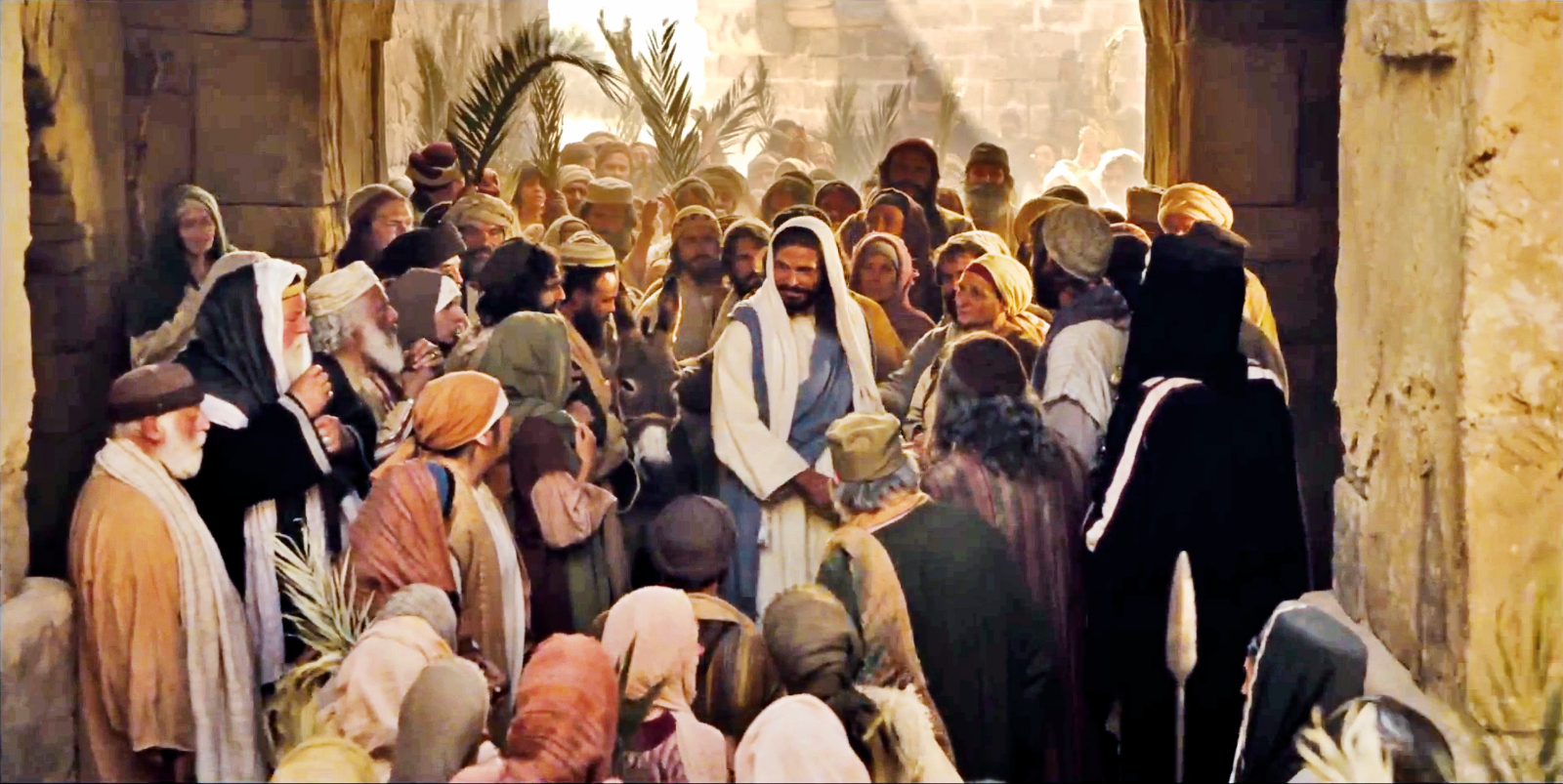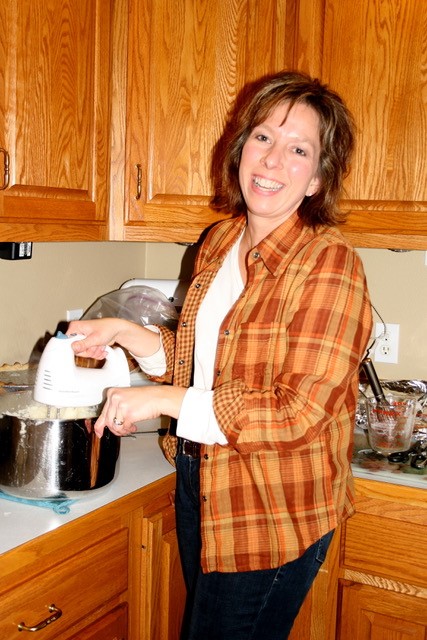Note: This message was originally presented on Sunday, April 5, 2020 at the First Reformed Church in Orange City, Iowa. A video of the teaching is embedded at the bottom of the page.
Good morning, everybody. On behalf of my wife Tamara and our family, I want to wish you all a blessed Palm Sunday. I also want to thank you for spending this time with me each week. I miss all of you very much. I miss the swelling of our voices in song. I miss the laughter in the Fellowship Hall. I miss the sacraments and the choir and the zest of Sunday School.
I especially miss you this week, because it’s Palm Sunday. Palm Sunday morning is my favorite worship service every year. For whatever reason, I like it even more than Christmas or Easter. Maybe it’s the music. Maybe it’s the smiling faces of the children carrying their palm fronds. Maybe it’s the sense that spring is coming. An any rate, I love it.

But this year, Palm Sunday isn’t the same.
Try as we might, our spirits don’t have their usual jubilation. Our sanctuary sits quiet and empty. We cannot clasp hands or share hugs. We live in a season of sorrow. We’re experiencing an era of isolation. And the longer we live in this reality, the farther it seems that we are from the end. It is growing clear that we face an open-ended season of grief and pain.
Each week, the weight of the moment grows heavier. The numbers of people globally impacted by COVID continue to climb. More and more people in the USA are becoming infected. Members of our own families have Coronavirus. It can feel like the walls are closing in on us.
And in this time, our sense of helplessness and vulnerability has mounted. We feel afraid and alone. We feel orphaned and isolated. We are living out Psalm 121; we lift up our eyes and ask: Where does our help come from? Who will see us through this sadness? Who will deliver us from this grief? Who can we trust? Upon whom can we call?
This is coming from a personal place.
Over the past week, I have felt a change in my own spirit. Ten days ago, I would have told you that I relish the challenge of ministry in this time. I would have told you that I was built for times like this. I would have told you this was my Isaiah 6 moment – to step up when mettle is tested and faithful leadership is required.
But over the last few days, I’ve been increasingly weighted with grief and sadness. This has come from knowing more and more people who have been personally impacted by the spread of Coronavirus. They have told me that they have listened over the phone as their children struggle to breathe. They have shared with me that their income streams are gone or imperiled. Honestly, the weight of our church’s heartache is increasingly moving me to tears.
I lift up my eyes to the hills. Where does my help come from?

Over the same span of time, I have come to a new appreciation of the Palm Sunday story. When I began preparing this message, I wondered how I could form a sermon out of a text that’s all about joy and celebration when we’re living in a time of pain and desperation.
But as I thought more and more about this, as I prayed and reflected, it became increasingly clear to me that this story, right now, is exactly what we require: The arrival of Jesus, this mighty and beautiful inbreaking, is exactly the point; it’s exactly the hope that we so profoundly need.
All of us are right now standing on the side of the road. Our eyes look in hope to the crest of the hill. To the top of the curve. We need a reason to hope again.
So please, don’t change the radio station. Don’t click the red box right now, don’t grab your remote, , do not press the home button until you hear this word from scripture today: Lift up your eyes to the hills and believe this: The King is Coming.
John chapter 12 says this:
The next day the great crowd that had come for the festival heard that Jesus was on his way to Jerusalem. They took palm branches and went out to meet him, shouting, “Hosanna!” “Blessed is he who comes in the name of the Lord!” “Blessed is the king of Israel!”
Jesus found a young donkey and sat on it, as it is written: “Do not be afraid, Daughter Zion; see, your king is coming, seated on a donkey’s colt.”
At first his disciples did not understand all this. Only after Jesus was glorified did they realize that these things had been written about him and that these things had been done to him.
This is the word of the Lord. Thanks be to God.
Friends, the Palm Sunday story is one of a surprisingly small number of stories that appear in all four of the New Testament gospels. This Triumphal Entry of Jesus is narrated by Matthew and by Mark and by Luke and by John. One of the results of this is that our mental picture of the Palm Sunday procession tends to be a composite. It is a combination of all four gospel versions.

This morning, I’d like us to try to unthread that composite and to spend some time alone – in the interview room, as it were – with John alone. What does John want us to know about that amazing day in Jerusalem 2000 years ago?
John says in Chapter 20 of his gospel that there is an encyclopedia’s worth more that he could tell about Jesus, but what he has written down in his book has been presented so that you may believe that Jesus is the Christ, the Son of God, and that by believing, you may have life in his name. He has compiled his gospel carefully, in other words, knowing there are can’t miss essentials he wants to make sure you understand.
Let me offer these using three keywords:
John’s report about Palm Sunday is a story of Royalty, of Urgency, and of Mystery.
Let’s talk first about royalty.
John has a clear message, a high-bandwidth message for his readers: Jesus is the true and only King of the world. Jesus is the good and rightful king of God’s people. Verse 13 remembers the people’s song: Blessed is the King of Israel! they sang.
But even if he hadn’t passed on that witness, most of John’s readers would have known what was happening simply by the details about the palm branches and the description of the parade. Events like this were not uncommon occurrences in the ancient world; kings and emperors and generals loved to lead processions through the towns to receive the praises of their people. Palm branches, especially for the Jewish people, were signs of victory and allegiance.
But if anybody was still wondering, John says it explicitly in verse 14: He says “Jesus found a young donkey and sat on it, as it is written: 15 “Do not be afraid, Daughter Zion; see, your king is coming, seated on a donkey’s colt.”
That’s a quote from the Prophet Zechariah that had preached more than 500 years earlier. These were words to a people who had lived through exile…people who had lost normalcy, in some respect. Like us, they probably struggled to see the light at the end of the tunnel. But Zechariah held out the hope of a King.
Palm Sunday is a story about the coming of a King. A king who had been longed for, prayed for. The final king. The righteous king.
What does it mean to be a king? The king symbolizes power and prestige. In many situations, the king represents the best of us. The noblest. The bravest. The wisest.
The king represents the nation. The king is the stand-in, the singular embodiment of the people.
In our country, we don’t have kings or queens. We have representative government. Our leaders have authority on the basis of elections. They have been nominated and voted in.
But the king is different. The king doesn’t reign on the basis of the ballot. The king reigns because of blood. He either ascends to the throne because of his birthright – his own royal blood – or he claims the crown because another’s blood has been shed and he has seized control.
Jesus, however, is a different kind of King. He becomes the king of his people not because of his ancestry or because he overpowered another leader. Jesus is king by virtue of his own shed blood. He neither inherits power or seizes power. He comes to change the whole notion of power.
In Jesus’ kingdom, power is not taken, it is given. He has come to be something, to deliver something, to save the people.
This truth is recognized by the attendees of the parade that day.
And it is visible in their urgency.
Or, maybe it’s better to say that it is “audible” in their urgency. Because if you could hear them that day, you’d know the desperation of the people there.
So much of what is really going on in this story is unlocked once you understand what that word “Hosanna” means. It’s a profound word, a layered word.
Hosanna appears often in our songs and our liturgy. And perhaps with this increased familiarity has come decreased impact. What does Hosanna really mean?
Well, Hosanna is one of those special words that appear in our Bible untranslated. Hosanna is a word that is transliterated. What is the difference?
Well, a transliterated word is a word that is written with English letters necessary to make it sound like it did in ancient times. Translation, on the other hand, is using an English word that means the same thing.
So, for instance, in ancient times, they would have said “dag et lechem” – but our Bibles say “fish and bread.” That’s translation. Word-for-word.
Hosanna – along with words like amen and shalom and phrases like Talitha Kum in Mark 5 – are left in the original wording in our English Bibles. I think that’s in part because the translators want you to hear today what you would have heard then if you had been there.
I think it’s also because sometimes, there just isn’t an equivalent English word or phrase to be used.
I really believe that’s what’s going on here with Hosanna. It isn’t translated because you can’t exactly translate it.
Hosanna is a compound word… the first part of it is hosa; that much we can translate. It means “save” or “rescue” or “deliver”. That is a word that is found in Hebrew names like Hosea and Joshua.
But the people aren’t crying out “Hosa.” They are saying “Hosanna” – they are shouting Save us…Na!
Translators call na a “particle of Intensity.” It is half-word that you add to another word to demonstrate your urgency, your deep need.
Na means “And do it now!” it means “Please!” It means “We’re begging you!” Na is a soul-cry. It’s primal. It is anguish and desperation. Na is hope and longing. It’s a gasp for air.
This time of year, we speak and sing that word commonly. But maybe we don’t understand the immediacy, the craving, in what we are saying. Hosanna doesn’t simply mean “Praise the Lord.” It means something deeper than that.
That means that when the people cried out “Hosanna” to Jesus, they weren’t just saying, “Oh king, you are a great guy. Congratulations on your coronation. Enjoy the perks.”
No, to cry hosanna means to say “Our world needs change! It cannot stay the same. And it’s on you to make it happen! We are pinning our hopes this! Act now, we’re begging you!”
Don’t miss this, friends: The king is not just celebrated for his own benefit, the king is accorded the responsibility to come through for the people. The king has to come through. He has to make a way. He has to deliver. And he has to deliver immediately. Na.

Today, Palm Sunday 2020, is a time for us to cry Hosanna once again. Because of Coronavirus, we are looking for help and rescue. We long to be saved. We have loved ones that need deliverance.
Because more and more we sense that time is running short. Our world needs a cure, a vaccine, a breakthrough. Come on, King Jesus! Come on, God! I know that I am praying that prayer every day.
At times like this I am reminded of that great song, “Cry out to Jesus,” recorded a couple of years ago, by the band Third Day. The song says this:
And to all of the people with burdens and pains
Keeping you back from your life
You believe that there’s nothing and there is no one
Who can make it right
There is hope for the helpless, rest for the weary, and love for the broken heart
And there is grace and forgiveness, mercy and healing
He’ll meet you wherever you are
Cry out to Jesus. Cry out to Jesus.
By now I’m sure that some of you have heard or read the story of Mari Hofer, the beautiful wife, teacher, and mother from Huron, South Dakota. If you haven’t, this is how the Argus Leader begins her story:
Mari Hofer died in a matter of hours. The mother of three laid down for a nap Friday evening after complaining of heartburn. But when she woke up, she couldn’t breathe.
“You wouldn’t have known anything different from any other day,” said her husband Quint Hofer.
 Mari worked remotely on Friday as a third-grade teacher at James Valley Christian School, since school was closed amid the COVID-19 pandemic. She cooked and cleaned the house like normal, too.
Mari worked remotely on Friday as a third-grade teacher at James Valley Christian School, since school was closed amid the COVID-19 pandemic. She cooked and cleaned the house like normal, too.
But Mari died from COVID-19 early Saturday morning. The relatively healthy 51-year-old told her husband she had trouble breathing just before 8 p.m. on Friday and needed emergency care.
Quint, 51, helped her change into slippers, walk down the stairs and help her into their car. Two of their children watched as they drove away, and he called the emergency room to warn them that they potentially had COVID-19 exposure.
As he met a nurse dressed in personal protective equipment in the ambulance bay, she commented on Mari’s discolored lips before rushing her inside. That was the last time he saw his wife.
Despite being intubated, put on a ventilator and health workers performing CPR for over an hour, Mari died at 2:55 a.m. on Saturday after being airlifted from Huron to the Avera McKennan Hospital in Sioux Falls — less than six hours after calling for help.
Lord Jesus, King of Israel, Save us, your people! Hosanna, God! Hosanna!
What does John intend for us to know?
Lastly this: That in the presence of royalty, even in a time of urgency, there remains a deep mystery.
Did you hear how John ended his report? He says in verse 16: At first his disciples did not understand all this. Only after Jesus was glorified did they realize that these things had been written about him and that these things had been done to him.
This is a challenging verse, but it’s a crucial one. It’s so enlightening.
John says that amid all of the celebration, the pleading, the yearning, and the spectacle, the disciples did not understand it.
Now, remember, John isn’t speaking condescendingly. He’s not pointing fingers. John was one of those disciples. He was actually one of the inner circle among the disciples. And even John must admit: I didn’t get it. I couldn’t see. I couldn’t fathom all that the king was doing.
Church, this is a stunning admission. What you might expect would be John saying, “Yes, the people there by the road that day had a hard time appreciating who Jesus really was. But we disciples, we faithful ones, we knew all along what the King was up to. And eventually everybody else came to know what we knew.”
But that is not at all John’s message. He pretty much says the opposite! John says: We who knew Jesus best actually had the hardest time understanding what was happening.
Friends, this is the reality of being a disciple of Jesus. There are some times in life – and a global pandemic certainly counts as one of those times – in which we who believe and proclaim a powerful and loving God have the hardest time understanding what is happening.
It is all a mystery: We believe Jesus is king! We know he can save us! We are the people of the Hosanna! And yet the virus keeps spreading. Layoffs keep happening. Hospitalizations keep increasing. People keep dying.
So we’re right there with John today, aren’t we? We just can’t fathom what is happening around us.

But even as John meets us in our own confusion, as he acknowledges the mystery, he also affirms a certainty. He says “Afterwards, we came to realize.” Afterward – after Jesus was fully glorified, we did come to appreciate what was happening. In the end, we were able to understand.
Church, this is our hope. Our hope ultimately lies in what we will see and know after the King’s final glorification.
Someday, our cries of Hosanna will be answered in ways ten thousand times better than we could have ever hoped.
Someday, the king’s rule will overwhelm all enemies and opponents. Even Coronavirus. Even death.
Until then, we stand with palm branches ready, declaring to the world Hope is not lost!
Dwelling in the mystery, honest about our urgency, hopes pinned on Jesus’ royalty, we lift up your eyes.
Because the King is coming!
In the name of the Father, and the Son, and the Holy Spirit, Amen.


